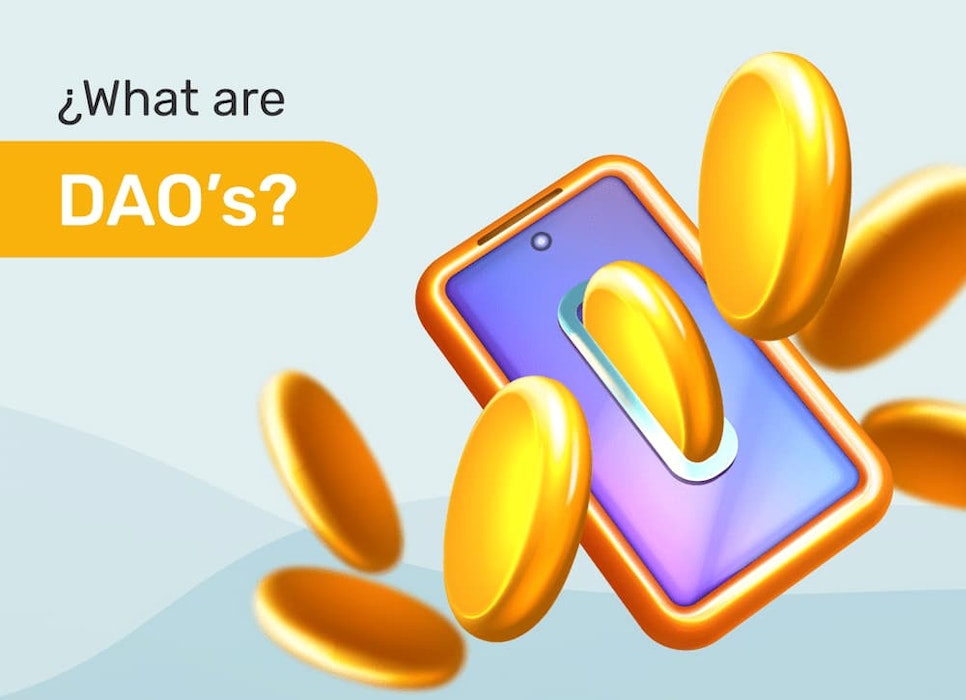Decentralized Autonomous Organizations (DAOs) are among the most popular blockchain concepts. It is also not difficult to see why: with a decentralized organization, the decisions of a company or organization are not made by the same people as always because here, everyone has a voice. Employees, partners, and users do; this means that anyone with an interest or involvement in an issue related to the organization can vote on how it should be addressed. Of course, decentralized management is not without difficulties, but there is also no doubt that this type of structure has enormous potential. In this article, we will explain everything you need to know about DAOs, how they work, and a question we all ask ourselves, are they decentralized?
Let's talk about DAOs.
DAOs are decentralized autonomous organizations that operate using smart contracts. They are independent because shareholders can vote on issues that affect the organization, and they are decentralized because it is performed without a single point of control. In essence, a DAO is a blockchain-based organization that is owned and governed by its community of shareholders. This can include employees, customers, and even investors. DAOs have several advantages over traditional companies, such as greater fairness, traceability, lower operating costs, and greater security. DAOs can be organized in various ways; they can be fully decentralized, meaning there is no governing body, and anyone can join or leave the organization at any time. They may also be partially centralized, with the governing body having some degree of control over the organization's operations.
How do DAOs work?
The protocol creates a smart contract on the blockchain to operate a DAO. This contract controls the DAO and contains all the information related to its operations. The contract is programmed to work on a decentralized blockchain, giving it full transparency and traceability. Anyone can join the DAO by contributing tokens or transferring assets like shares or property. When the DAO holds votes, all its stakeholders can make decisions based on their opinion on a specific issue, such as the issuance or not of a dividend, the payment of salaries, or anything you can imagine. If the DAO issues tokens, the protocol allows the holders of these tokens to participate in the future decision-making processes of the organization. This way, token holders can vote on issues affecting the DAO directly.
The problems of DAOs and the ways to solve them
The greatest challenge of DAOs is the management of economic incentives. How do you incentivize people to continue participating in a decentralized organization without a centralized financial incentive? This issue can be addressed by giving token holders the right to vote on important issues, such as the completion of a significant acquisition. This can help give people a sense of ownership of an organization and a direct financial incentive to stay involved. There are also minor security challenges to overcome; as DAOs are decentralized, there is no central point of control over the network. That is why you must develop a relatively secure smart contract to guarantee that no one manipulates the network.
Are DAOs decentralized?
DAOs are promoted as decentralized, but the reality is that they are not really. The protocol connects the DAO to a decentralized blockchain, but the data is stored on the private Ethereum network. If the Ethereum network is attacked or compromised, so is the DAO data. However, this is not a significant concern in practice. Another fundamental debate around DAOs is what happens at the time of a vote; since some organizations allow their participants to cast unlimited votes, this can cause some votes to be biased by the desire of a specific participant.
One of the most recent cases was that of Mango DAO, where a hacker stole $100 million and created a vote stating that he could keep part of the money and return another if no charges were filed against him. The funny point of this story is that the hacker used the money he stole to cast 33 million votes for his proposal, and just like that, he managed to keep $47 million and save himself from a lawsuit.
DAOs are indeed a new and exciting concept, but they will not be able to transform the world of business unless they can overcome the current challenges. For now, there is a lot of work to be done, but we will likely continue to see an increase in the development of DAOs in the coming years.
El Dorado is the perfect place to buy and sell cryptocurrencies; the best is that you can do it using your local currency and paying with one of the +30 payment methods we have available on our platform.
Don't wait any longer, and start saving dollars safely with us!
